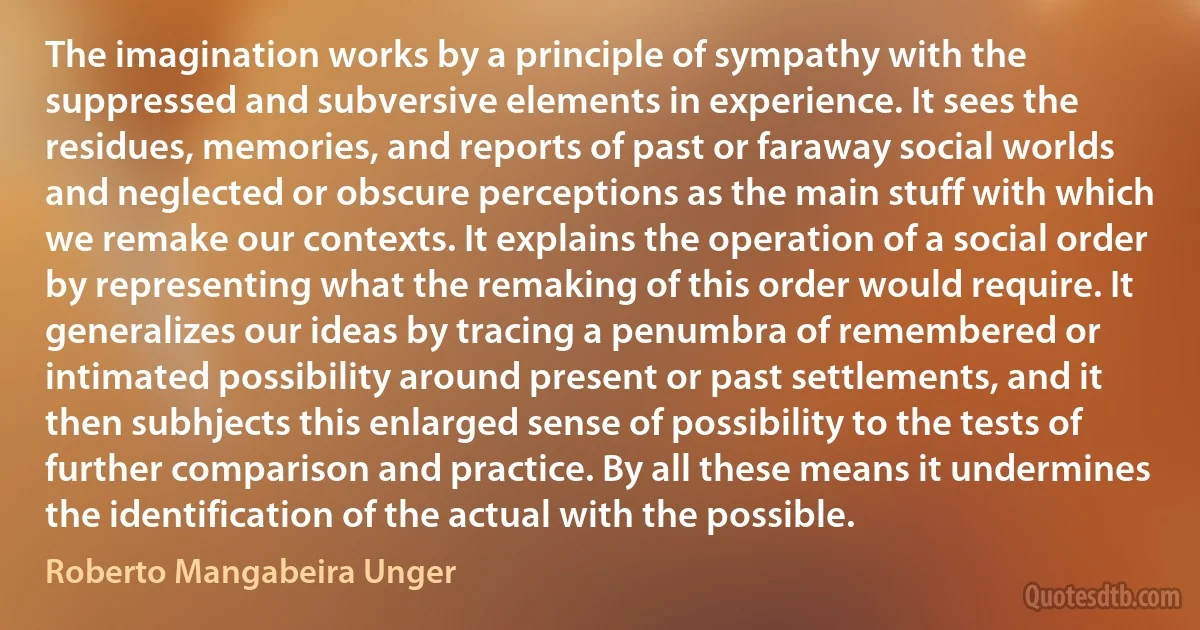
The imagination works by a principle of sympathy with the suppressed and subversive elements in experience. It sees the residues, memories, and reports of past or faraway social worlds and neglected or obscure perceptions as the main stuff with which we remake our contexts. It explains the operation of a social order by representing what the remaking of this order would require. It generalizes our ideas by tracing a penumbra of remembered or intimated possibility around present or past settlements, and it then subhjects this enlarged sense of possibility to the tests of further comparison and practice. By all these means it undermines the identification of the actual with the possible.
Roberto Mangabeira UngerRelated topics
experience identification operation order past possibility possible practice present remake sense tracing means works remaking representingRelated quotes
This education, therefore, results at the very outset in knowledge which transcends all experience, which is abstract, absolute, and strictly universal, and which includes within itself beforehand all subsequently possible experience. On the other hand, the old education was concerned, as a rule, only with the actual qualities of things as they are and as they should be believed and rioted, without anyone being able to assign a reason for them. It aimed, therefore, at purely passive reception by means of the power of memory, which was completely at the service of things. It was, therefore, impossible to have any idea of the mind as an independent original principle of things themselves.

Johann Gottlieb Fichte
I had before me the product of two mutually exclusive philosophies. Economism would insist that having made the perfect pencil, Thoreau should make more pencils and sell them for money with which to buy more material to make still more pencils to sell for money to buy still more material, and so on, because the making and selling of pencils is the whole content of life. Thoreau did not believe it is the whole content of life. It was clear that economism's philosophy was the only one which my companion was capable of accepting. Detach him from his particular specialised practice of it, and existence would have no further meaning for him; and in this he was representative of the great bulk of society in this present age.

Albert Jay Nock
Great works of literature have frequently been produced by authors writing under assumed names. Despite readers' curiosity and the public's interest in identifying the creator of a work of art, an author generally is free to decide whether or not to disclose her true identity. The decision in favor of anonymity may be motivated by fear of economic or official retaliation, by concern about social ostracism, or merely by a desire to preserve as much of one's privacy as possible. Whatever the motivation may be, at least in the field of literary endeavor, the interest in having anonymous works enter the marketplace of ideas unquestionably outweighs any public interest in requiring disclosure as a condition of entry.

John Paul Stevens
2) "the a of différance also recalls that spacing is temporization, the detour and postponement by means of which intuition, perception, consummation - in a word, the relationship to the present, the reference to a present reality, to a being - are always deferred. Deferred by virtue of the very principle of difference which holds that an element functions and signifies, takes on or conveys meaning, only by referring to another past or future element in an economy of traces. This economic aspect of différance, which brings into play a certain not conscious calculation in a field of forces, is inseparable from the more narrowly semiotic aspect of différance.

Jacques Derrida
By and large the literature of a democracy will never exhibit the order, regularity, skill, and art characteristic of aristocratic literature; formal qualities will be neglected or actually despised. The style will often be strange, incorrect, overburdened, and loose, and almost always strong and bold. Writers will be more anxious to work quickly than to perfect details. Short works will be commoner than long books, wit than erudition, imagination than depth. There will be a rude and untutored vigor of thought with great variety and singular fecundity. Authors will strive to astonish more than to please, and to stir passions rather than to charm taste.

Alexis de Tocqueville
